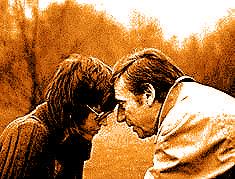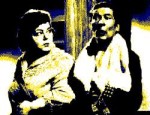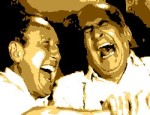Film Review
In
Tout va bien, Godard continues a theme he has been developing in his earlier
films, most notably
La Chinoise and
Weekend. As in those films,
he gets his principal characters to rant extreme left-wing rhetoric in a way that, far
from promoting the left-wing cause, actually seems to undermine it. Although it
does not use graphic nihilistic imagery to the same extent as
Weekend,
Tout
va bien is the most pessimistic of these films and almost seems to imply that nothing,
not even left-wing thinking, can prevent the decline of modern society into a dehumanised,
commercialised anti-culture.
Godard's cinema is rarely as overtly cynical and self-mocking as in this film -
and this is probably one of the main factors which contribute to the film's obvious
inaccessibility and its failure as a commercial film. Yves Montand's character
is clearly meant to represent Godard himself - once a great director, with good
ideas and influence, reduced to making tawdry advertisements to earn a living.
Godard clearly states his aversion to using star names in the film's original introduction,
yet acknowledges that he has to have star names like Montand and Jane Fonda to win financial
backing. (Paramount supported the film but subsequently pulled out of distributing
it.) Jean-Luc Godard is clearly a very embittered man by this stage in his career -
and this does mar the film.
Despite Godard's apparent reluctance to have them on board, Montand and Fonda both
make a positive contribution to the film. Montand is convincing as the sad, middle-aged
man forced into prostituting his film-making talents. Fonda, at the time something
of a political activist, is clearly in tune with the thrust of the film and gives an effective
performance.
Despite such strong performances from its stars, the film is one of Godard's least
accessible. This is partly because Godard deliberately avoids structure (and even
goes to far as to state that, for a sophisticated cinema-goer, any kind of plot is unnecessary).
The film launches into left-wing propaganda far too soon, immediately alienating those
who have aversion or concerns about such political views.
© James Travers 2000
The above content is owned by frenchfilms.org and must not be copied.
Next Jean-Luc Godard film:
Sauve qui peut (la vie) (1980)
Film Synopsis
An American reporter and her husband, a burnt-out film director, are interviewing the
manager of a sausage factory when there is a workers' revolt. The workers
spout left-wing Maoist doctrine whilst holding the three prisoner in the manager's
office. Later, the reporter and her husband discover that their marriage is failing...
© James Travers
The above content is owned by frenchfilms.org and must not be copied.



